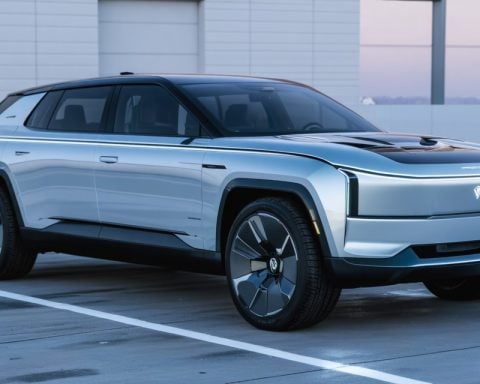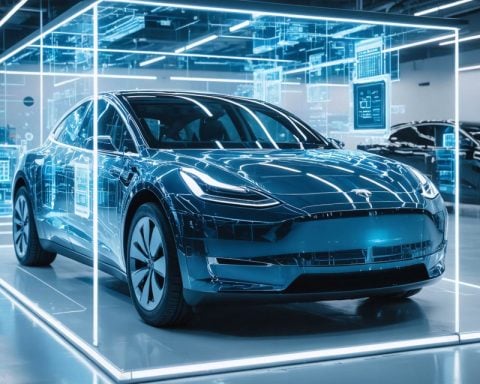The Biden administration has announced an ambitious initiative, allocating over $735 million in grants aimed at purchasing approximately 2,400 zero-emission vehicles. This funding arrives as part of the 2022 climate legislation, which facilitates a hefty $370 billion in investments throughout various governmental sectors focused on climate and energy advancements.
Despite this substantial financial injection, a significant portion of the allocated funds remains unutilized. The current administration is under pressure to distribute these resources swiftly, especially with the impending transition to a new presidency. The incoming President-elect Donald Trump has previously shown skepticism towards the current administration’s electric vehicle initiatives, intensifying the urgency of the situation.
As the political landscape evolves, tensions are rising among congressional Republicans. There is an increasing possibility that they may challenge or attempt to alter the Biden administration’s plans regarding electric vehicles and infrastructure investments. The urgency to implement these programs increases, as federal support for green initiatives may face hurdles in the near future.
This wave of funding represents a vital step towards a more sustainable transportation future. It not only aims to reduce carbon emissions but also positions the United States as a leader in the global transition towards clean energy technology. The focus now shifts to the execution of these projects and the realization of their intended environmental impacts.
America’s Electric Vehicle Revolution: Unpacking the Biden Administration’s Strategy
The Biden administration has set a robust course for the future of transportation by announcing a significant initiative of over $735 million in grants. This financial boost aims to procure around 2,400 zero-emission vehicles, marking a pivotal moment in the national effort to combat climate change and transition towards sustainable energy practices. This funding is part of the larger $370 billion initiative outlined in the 2022 climate legislation, which targets various sectors to enhance climate resilience and promote energy innovation.
Key Features of the Initiative
1. Funding Overview: The $735 million in grants for zero-emission vehicles will be allocated to various governmental agencies and sectors. The goal is to increase the adoption of electric vehicles (EVs), which are integral to reducing greenhouse gas emissions in the transportation sector.
2. Environmental Impact: This funding is expected to significantly reduce carbon emissions, contributing to the Biden administration’s ambitious goals of achieving net-zero emissions by 2050. The focus on zero-emission vehicles signifies a crucial step towards sustainable transportation solutions.
3. Infrastructure Development: The initiative does not solely concentrate on vehicle procurement. It also aims to enhance the infrastructure necessary for supporting electric vehicles, including charging stations, which will bolster the shift to electric mobility.
Market Trends and Insights
The launch of this initiative coincides with a broader trend of increasing adoption of electric vehicles in the U.S. and globally. Several factors drive this trend, including:
– Public Support for Green Initiatives: A growing segment of the American population supports EVs, viewing them as essential for combatting climate change.
– Technological Advancements: Innovations in battery technology and renewable energy sources are making electric vehicles more efficient and affordable.
– Corporate Commitments: Major automotive manufacturers are ramping up their production of electric vehicles, following consumer demand and regulatory pressures.
Pros and Cons of the Initiative
Pros:
– Environmental Benefits: The initiative is expected to significantly lower emissions, improving air quality and protecting public health.
– Economic Opportunities: The funding is likely to create jobs in manufacturing, infrastructure development, and maintenance of electric vehicles.
– Leadership in Clean Technology: Investing in electric vehicles positions the U.S. as a leader in the global clean energy transition.
Cons:
– Political Challenges: The impending transition to a new presidency creates uncertainty regarding continuity in electric vehicle initiatives.
– Infrastructure Gaps: There are concerns that without adequate charging infrastructure, the adoption of electric vehicles may be hindered.
– Budget Utilization: A significant amount of allocated funds still remains unutilized, which raises questions about the efficiency of fund distribution.
Future Predictions and Considerations
As the federal government moves forward, stakeholders are closely monitoring the rollout of this initiative. With the potential challenges from congressional Republicans, the emphasis on swiftly allocating funds becomes critical. Looking ahead, there is a significant chance that:
– Increased Focus on Sustainability: Future administrations may prioritize sustainability initiatives, with each transition possibly reinforcing or reconfiguring existing frameworks.
– Advancements in Technology: Continuous innovations in EV technology and renewable energy will likely shape the landscape of transportation in the coming years.
– Enhanced Public Policy: Policymakers may develop more comprehensive strategies to support hybrid and fully electric vehicles, driving further investments.
For further details on electric vehicle policies and sustainability efforts, visit the White House.


















